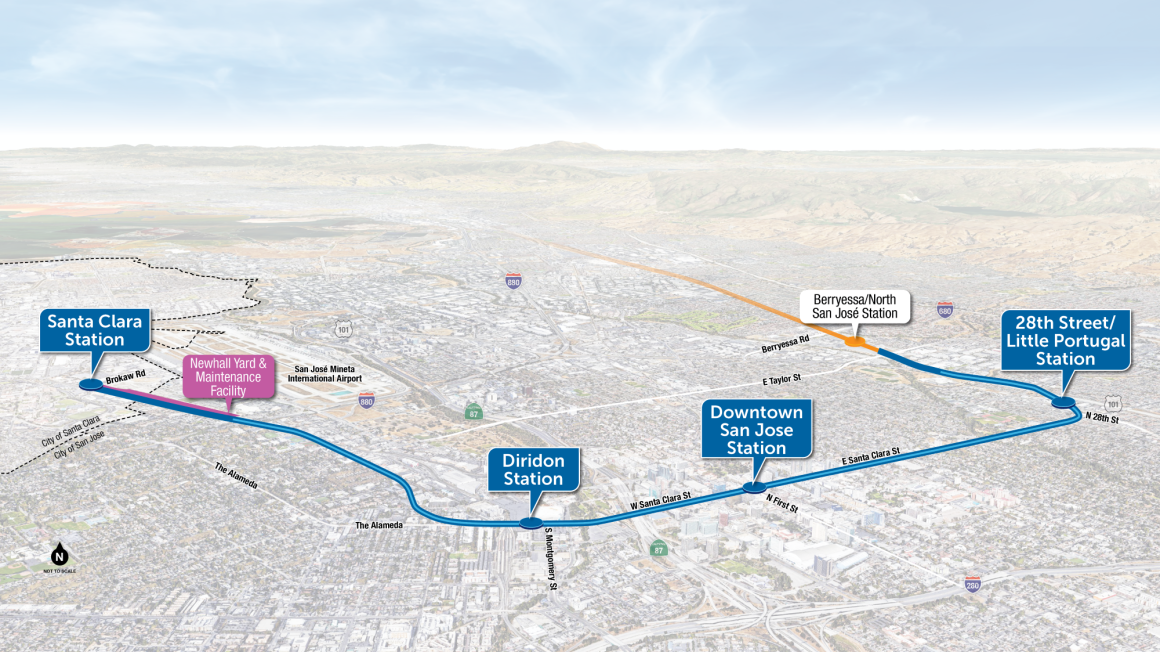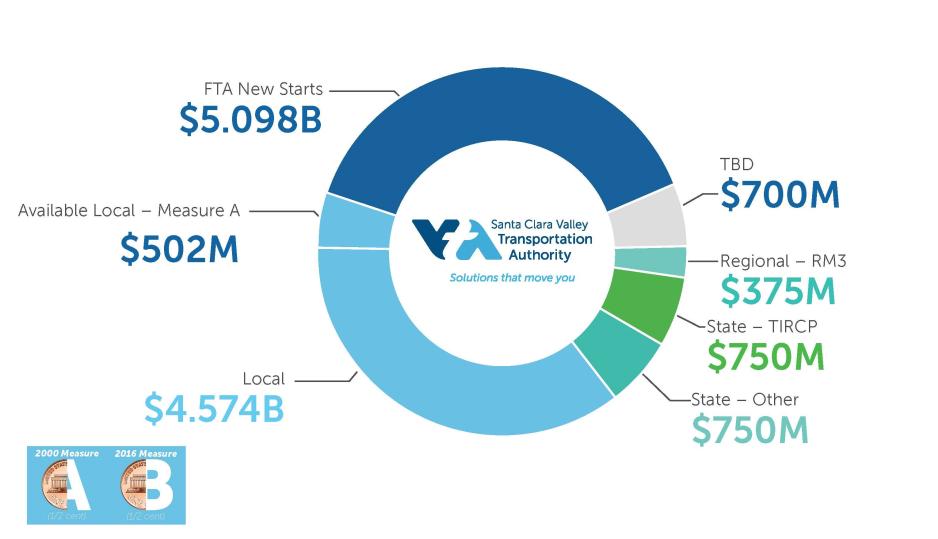On October 25, 2023, the Metropolitan Transportation Commission (MTC) voted to allocate the $375 million for Phase II of VTA’s BART Silicon Valley Extension Project, bringing regional BART service one step closer to downtown San José and Santa Clara.
Many funding sources are required for the successful completion of mega infrastructure projects.
Developing a robust funding strategy is essential in delivering large, long-term, projects like VTA's BART Silicon Valley Phase II Extension (VTA’s BSVII Project). Funding strategies for projects of this scale typically include local and regional funding mechanisms, which are often leveraged to obtain additional funds from state and federal funding programs.
Funding begins at the local level, usually with local sales tax measures or bonds.
Local funding is often necessary for leveraging additional financial support from regional, state, and federal agencies. A successful sales tax or bond measure is typically an indication that the local community recognizes the benefits of the transit investment and is willing to make long-term financial commitments for the future. For VTA’s BART Silicon Valley Program, such support comes in the form of local tax measures, which Santa Clara County residents have passed repeatedly over the past two decades.
Funding for the Program began in 2000 with the passing of Measure A, a 30-year half-cent (0.005%) sales tax devoted to specific public transit capital improvement projects and operations. Among the many projects identified for 2000 Measure A funds, approximately $1.2 billion was used to fund the construction of VTA’s BART Phase I Extension (which opened in 2020), and additional funding has been earmarked to fund construction of VTA’s BART Phase II Extension.
In 2008, Santa Clara County voters doubled down on their commitment to funding VTA’s BART Silicon Valley Program by passing the 2008 Measure B, eighth of a cent (0.00125%) sales tax dedicated to funding operations of the Program.
Then, in 2016, 71% of voters supported additional funding for VTA’s BSVII Project as well as highway, expressway and other transit projects with the passing of the 2016 Measure B, a second 30-year half-cent (0.005%) sales tax.
In total, Santa Clara County local sales tax measures are funding an estimated $4.3 billion for construction of VTA’s BSVII Project.
From counties to the region, the Bay Area supports transit projects.
In 2018, Bay Area residents approved Regional Measure 3 (RM3), which is anticipated to raise $4.45 billion to finance highway and transit improvements. This funding includes the purchase of new BART cars, extending Caltrain to downtown San Francisco, and $375 million towards the construction of VTA’s BSVII Project.
Historically, the San Francisco Bay Area has demonstrated a willingness and desire to fund transportation and transit improvement projects, with RM3 as the third such measure passed by the residents of the nine Bay Area counties. Prior measures include Regional Measure 1 (1988) and Regional Measure 2 (2004), which provided funding for several major infrastructure improvements including the rehabilitation of numerous bridges throughout the Bay, construction of San Francisco’s Central Subway, Interstate 80/680 interchange upgrades, e-BART extension to Pittsburg and Antioch, the BART-Oakland Airport Connector, and BART’s extension from Fremont to Warm Springs, to name a few.
The State of California continues to be a leader in transit investment.
The State of California offers multiple competitive grant programs to fund local transportation and transit projects, including the Traffic Congestion Relief Program (TCRP) and the Transit and Intercity Rail Capital Program (TIRCP). Funding for TIRCP grants comes largely from the Greenhouse Gas Reduction Fund, an investment fund that supports the construction of transformative capital improvements that will modernize California’s transit systems, while helping to curtail greenhouse gas emissions from automobile use. Securing local or regional funding for these projects is often needed to obtain these grant funds as matching funds are required.
In 2018, the TIRCP awarded VTA $750 million to fund VTA’s BSVII Project. An additional $375 million was awarded to VTA for the BSVII Project following a State surplus, increasing state funding to $1.125 billion.
In 2023, the State provided additional funds for MTC to allocate towards transportation infrastructure and operations in the Bay Area. On October 25, 2023, MTC committed an additional $375 million to fund the construction of VTA’s BSVII Project, bringing the total state funding to $1.5 billion.
The Feds add to the pot.
The Federal Transit Administration (FTA) has numerous funding programs for large transit projects, including its Capital Improvement Grant (CIG) program, which oversees the New Starts funding program. This program, along with its smaller sister program (Small Starts Program), has funded many of the country’s transit investments seen over the past several decades. These are competitive programs, meaning agencies need to apply for these grants. During the application process, FTA’s New Starts Program reviews various project information, including ridership projections, existing and future land uses, and local policies to determine whether a particular project would qualify for CIG funding. One major factor that distinguishes VTA’s BSVII Project from other competitive projects is the amount of local funding already committed. By leveraging over $6.2 billion in local and state funding, VTA has been accepted into FTA’s New Starts Program and continues to receive “favorable” ratings in its ongoing evaluations.
VTA anticipates receiving a full funding grant agreement (a commitment to fund the project known as the FFGA) for approximately $6 billion, or approximately 50% of the total cost of VTA’s BSVII Project, in late 2024. With that, VTA will have secured the last remaining piece of the funding pie.

